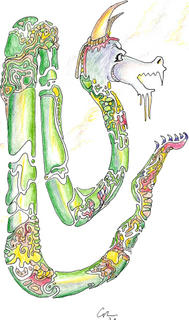Perfected Ignorance

I was looking up a number in the phone book the other day and someone said, "The names are in alphabetical order so Mumwat Hennel will be under H". Man, I'd been starting at the beginning of the phone book and working my way through for two weeks trying to find this guy. Suddenly I realized why nothing I'd learned made any sense. Alphabetical order! What an incredibly perverse way to to present information.
I had assumed that information was supposed to be sequential, one fact leading to another in a nice tidy progression. I mean that's the way the other books I've read were written. Except for the Encyclopedia of course. Now there's one book (26 actually) that nearly made me despair of ever learning anything. Now it all makes sense, it's in alphabetical order! I spent three years reading an entire 26 volume encyclopedia thinking it was revealing knowledge in some really strange sequence. I figured that I'd eventually discover whatever magical code was secretly embedded in all those apparently random articles.
a cappella:(Italian: "in the church style"), performance of a polyphonic (multipart) musical work by unaccompanied voices. Originally referring to sacred choral music, the term now refers to secular music as well.The a cappella style arose about the time of the composer Josquin des Prez, in the late 15th century, and reached preeminence with Palestrina in the late 16th century in the music ...
Followed by:
a lo divino:(Spanish "in the sacred style" or "in sacred terms") in Spanish literature, the recasting of a secular work as a religious work, or, more generally, a treatment of a secular theme in religious terms through the use of allegory, symbolism, and metaphor. Adaptations a lo divino were popular during the Golden Age of Spanish literature during the 16th and 17th centuries.
Now so far I could believe the first volume of the encyclopedia was going to reveal some kind of religious Truth. But then comes:
a posteriori knowledge:knowledge derived from experience, as opposed to a priori knowledge (q.v.).
And it gets worse:
|
a priori knowledge
'A'ishah
|

|
I read volume one and kept on going believing I would find some deep meaning in the bazarre ordering of apparent non sequiturs. I think that explains why I can't maintain a conversation for more than the time it takes to read two paragraphs. Why would the people in whom we have entrusted with all human knowledge devise such a cruel decpetion? Why would they force us to jump from here to there and back again to learn even the simplest detail? Could it be that they are laughing at our credulity the whole time, snickering at the thought of my befuddledment?
I am on to them now though. Alphabetical order, ha! Their foul conspiracy is exposed. Let's see just how smart they really are and challenge them to create an encyclopedia in topical order, a collection that can be read from front to back like any other book! Take that!

2 Comments:
I have carefully read your post and find it to be utterly without merit. If I possess knowledge it must follow that it pertains to something. Lacking content, knowledge is indistinguishable from ignorance. I know that I'm not ignorant which proves that I know at least one thing. From that fact it becomes obvious that knowledge is possible and, hence, there exist things to know about.
Fenemor Tudbury Esq.
Men are such fools! Of course I know stuff and I am often asked to share what I know with others. I know, for instance, that my neighbor down the street smokes dope and the woman across the street is sleeping with her next door neighbor, while they're both awake. Not only do I know these things, I've found ways to increase my income substantially using this knowledge.
Post a Comment
<< Home